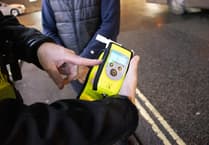CHILDREN of Callington Primary School will be tackling speeding motorists next Wednesday when they take part in force 'day of action' with local police.
The effective School Speedwatch scheme is being conducted in Callington for the first time, after local residents highlighted speeding as its top priority in PACT meetings (Police and Communities Together).
Motorists who are driving faster than the 30mph speed limit will be given the option of a fixed penalty or being 'grilled' by schoolchildren about their driving.
School Speedwatch has already been carried out at primary schools in Stoke Climsland and Delaware where it has had a positive effect.
There will also be speed monitoring at hotspots in Callington where there have been large amounts of complaints about motorists driving too fast.
Police will be enforcing the zig-zag lines in Callington town centre and offering security advice following a recent spate of creeper burglaries.
The day of action will be focusing on the problems that have come up at PACT meetings in the town. According to police community support officer Mark Stribley, involving the youngsters was a great way of reducing crime.
'School Speedwatch has been very successful because when the children speak to motorists it really does have the impact of driving speed down around the schools,' he said.
'The children talk to other pupils about it and take the message home to their parents.
'It's not just about speeding, the children learn the dangers of misbehaving in the car, which can distract the driver, and the importance of seatbelts.'
PCSO Stribley said the police had been back to monitor speeds on the A390 near Delaware school since School Speedwatch was conducted and it appeared that the message was getting across.
'Of 280 vehicles that we monitored, five were speeding, so things are improving,' he said.
He added that working with youngsters was part of the police's proactive approach: 'Primary school years are the formulative years for youngsters and if we can get the message across to children at that age it reduces the problems as they get older.'
An ongoing priority for the police has been to reduce incidents of anti-social behaviour by engaging with young people.
'I have been working in Callington for six years and certainly the youngsters I knew at ten are causing no problems at all at the age of 16. Things have improved dramatically in Callington as a result of intervention at a young age,' he said.



